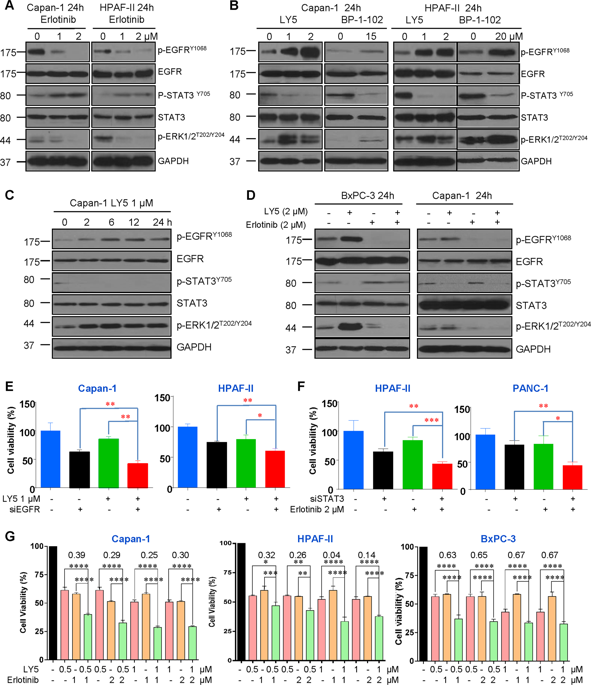Our official English website, www.x-mol.net, welcomes your
feedback! (Note: you will need to create a separate account there.)
Feedback activation of EGFR is the main cause for STAT3 inhibition-irresponsiveness in pancreatic cancer cells.
Oncogene ( IF 6.9 ) Pub Date : 2020-04-02 , DOI: 10.1038/s41388-020-1271-y Chengguang Zhao 1, 2, 3 , Lehe Yang 1, 2, 4 , Feng Zhou 1, 2 , Yun Yu 1 , Xiaojing Du 2 , Youqun Xiang 2 , Chenglong Li 5 , Xiaoying Huang 2 , Congying Xie 2 , Zhiguo Liu 1, 2 , Jiayuh Lin 4 , Liangxing Wang 2 , Guang Liang 1, 3 , Ri Cui 1, 2, 3
Oncogene ( IF 6.9 ) Pub Date : 2020-04-02 , DOI: 10.1038/s41388-020-1271-y Chengguang Zhao 1, 2, 3 , Lehe Yang 1, 2, 4 , Feng Zhou 1, 2 , Yun Yu 1 , Xiaojing Du 2 , Youqun Xiang 2 , Chenglong Li 5 , Xiaoying Huang 2 , Congying Xie 2 , Zhiguo Liu 1, 2 , Jiayuh Lin 4 , Liangxing Wang 2 , Guang Liang 1, 3 , Ri Cui 1, 2, 3
Affiliation

|
Pancreatic cancer is one of the world's leading causes of cancer-related death. Activation of STAT3 has been reported as a major contributor in pancreatic cancer tumorigenesis and chemoresistance. However, treatment of advanced pancreatic cancer patients with STAT3 inhibitors often meets drug resistance and heterogeneous response. We found that EGFR activation is a main cause for resistance to STAT3 inhibitors in pancreatic cancer cells, regardless of KRAS mutation status. Mechanistically, inhibition of STAT3 promotes STAT1- and STAT4-mediated TGF-α expression, leading to activation of the EGFR pathway. Combined treatment of pancreatic cancer cells with EGFR and STAT3 inhibitors persistently blocks EGFR and STAT3 signaling, and exerts synergistic antitumor activity both in vitro and in vivo, with or without KRAS mutation. Our results indicate that reciprocal cross-talk between STAT3 and EGFR pathways is a key molecular mechanism leading to resistance in pancreatic cancer cells. Furthermore, the study shows that combined inhibition of both EGFR and STAT3 might overcome drug resistance encountered during treatment with single agent alone. This study suggests an improved therapeutic strategy, through combined treatment with STAT3 and EGFR inhibitors, for pancreatic cancer patients.
中文翻译:

EGFR的反馈激活是胰腺癌细胞中STAT3抑制-无反应性的主要原因。
胰腺癌是世界上与癌症相关的死亡的主要原因之一。据报道,STAT3的激活是胰腺癌肿瘤发生和化学抗性的主要贡献者。但是,使用STAT3抑制剂治疗晚期胰腺癌患者通常会遇到耐药性和异质性反应。我们发现,无论KRAS突变状态如何,EGFR激活都是胰腺癌细胞对STAT3抑制剂耐药的主要原因。从机制上讲,抑制STAT3会促进STAT1和STAT4介导的TGF-α表达,从而激活EGFR途径。用EGFR和STAT3抑制剂联合治疗胰腺癌细胞会持续阻断EGFR和STAT3信号传导,并在体内和体外(无论是否具有KRAS突变)发挥协同抗肿瘤活性。我们的结果表明,STAT3和EGFR通路之间的相互干扰是导致胰腺癌细胞耐药的关键分子机制。此外,研究表明,EGFR和STAT3的联合抑制作用可能会克服单独使用单一药物治疗期间遇到的耐药性。这项研究表明,通过与STAT3和EGFR抑制剂联合治疗,可以改善胰腺癌患者的治疗策略。
更新日期:2020-04-02
中文翻译:

EGFR的反馈激活是胰腺癌细胞中STAT3抑制-无反应性的主要原因。
胰腺癌是世界上与癌症相关的死亡的主要原因之一。据报道,STAT3的激活是胰腺癌肿瘤发生和化学抗性的主要贡献者。但是,使用STAT3抑制剂治疗晚期胰腺癌患者通常会遇到耐药性和异质性反应。我们发现,无论KRAS突变状态如何,EGFR激活都是胰腺癌细胞对STAT3抑制剂耐药的主要原因。从机制上讲,抑制STAT3会促进STAT1和STAT4介导的TGF-α表达,从而激活EGFR途径。用EGFR和STAT3抑制剂联合治疗胰腺癌细胞会持续阻断EGFR和STAT3信号传导,并在体内和体外(无论是否具有KRAS突变)发挥协同抗肿瘤活性。我们的结果表明,STAT3和EGFR通路之间的相互干扰是导致胰腺癌细胞耐药的关键分子机制。此外,研究表明,EGFR和STAT3的联合抑制作用可能会克服单独使用单一药物治疗期间遇到的耐药性。这项研究表明,通过与STAT3和EGFR抑制剂联合治疗,可以改善胰腺癌患者的治疗策略。











































 京公网安备 11010802027423号
京公网安备 11010802027423号